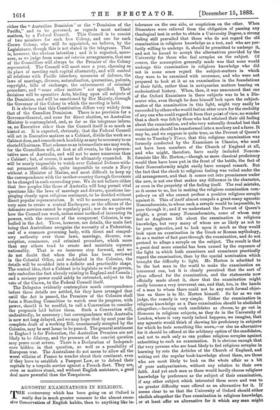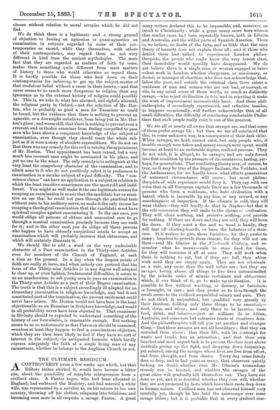AGNOSTIC ,EXAMINATIONS IN RELIGION.
THE controversy which has been going on at Oxford is really due in much greater measure to the almost exces- sive Conservatism of English habits, than to anything like in- tolerance on the one side, or scepticism on the other. When Dissenters were relieved from the obligation of passing any theological test in order to obtain a University Degree, a strong feeling still prevailed that those who do not regard the old examination in religions knowledge as a test, and who are per- fectly willing to undergo it, should be permitted to undergo it, and not be forced to accept the alternatives provided by the University for those who feel scruples on the subject. Of course, the assumption generally made was that none would undergo this examination in religious knowledge who did not in some sense regard the subject-matters in which they were to be examined with reverence, and who were not prepared to look at it as an examination in the foundations of their faith, rather than in antiquarian matters bearing on ecclesiastical history. When, then, it was announced that one of the Oxford Examiners in these subjects was to be a Dis- senter who, even though he does himself look upon the subject- matter of the examination in this light, might very easily be succeeded by others who would feel an utter scorn for the credulity of any one who could regard it from that point of view, no wonder that a shock was felt by those who had retained their old feeling about the examination, and who very naturally dreaded lest that examination should be transformed into a mockery and a farce. It may be, and we suppose is quite true, as the Provost of Queen's wrote to Tuesday's Times, that this religious examination was formerly conducted by the Examiners in Classics, who need not have been members of the Church of England at all, and who might, therefore, have easily included Noncon- formists like Mr. Horton,—though as mere classical proficiency would then have been put in the front of the battle, the fact of their Nonconformity might easily have escaped remark. But the fact that the shock to religious feeling was veiled under the old arrangement, and that it comes out into prominence under the new, is not one that makes any difference in the character, or even in the propriety of the feeling itself. The real mistake, as it seems to us, lies in making the religious examination com- pulsory on all who cannot profess a positive religious scruple against it. This of itself almost compels a great many agnostic Nonconformists, to whom such a scruple would be impossible, to pass through it ; and if we understand the Provost of Queen's aright, a great many Nonconformists, some of whom may feel as Anglicans felt about the examination in religious knowledge, but very many of whom are as likely as not to be pure agnostics, and to look upon it much as they would look upon an examination in the Greek or Roman mythology, do as a matter of fact pass through the examination, and do not pretend to allege a scruple on the subject. The result is that a great deal more scandal has been caused by the exposure of the light in which both examiners and examinees practically regard the examination, than by the special nomination which brought the difficulty to light. Mr. Horton is admitted to be the last man in the world to make the examination an irreverent one, but it is clearly perceived that the sort of pleas offered for the examination, and the statements now officially made about it, show that the examination might easily become a very irreverent one, and that, too, in the hands of a man to whom there could not be any such formal objec- tion sa there is to Mr. Horton himself. So far as we can judge, the remedy is very simple. Either the examination in religious knowledge as a Pass examination should be abolished altogether,—leaving such candidates as choose, to go out in Honours in religious subjects, as they do in the University of London, where it very rarely indeed happens, we imagine, that any agnostic would think of showing his proficiency in subjects for which he feels something like scorn,—or else an alternative for it should be offered at the arbitrary option of the candidates, and not to such only as can profess religions scruples against submitting to such an examination. It is obvious enough that the' very persons who are least likely to feel religions scruples in learning by rote the Articles of the Church of England, and writing out the regular book-knowledge about them, are those who are most likely to look on the whole affair as a bit of pure antiquarianism, without any relation to their own faith. And yet such men as these would hardly choose religious knowledge by preference as the subject of their examination, if any. other subject which interested them more and was to no greater difficulty were offered as an alternative for it. If seems clear to us that the University of Oxford should either abolish altogether the Pass examination in religions knowledge, or at least offer an alternative for it which any man might
choose without relation to moral scruples which he did not feel We do think there is a legitimate and a strong ground of objection to forcing on agnostics or quasi-agnostics an examination in subjects regarded by some of their con- temporaries as sacred, while they themselves, with others of their contemporaries, may regard them as not very different in kind from the ancient mythologies. The mere fact that they are regarded as matters of faith by some, makes them something quite different from mere matters of history to those who would otherwise so regard them. It is hardly possible for those who look down on their contemporaries for believing, to get up the subject-matter of that credulous belief without a sneer in their hearts,—and that sneer seems to us much more dangerous to religion than any ignorance as to the external history of religion could possibly be. This is, we take it, what has alarmed, and rightly alarmed, the religious party in Oxford,—not the selection Of Mr. Hor- ton, who is probably as good a man for Examiner as could be found, but the evidence that there is nothing to prevent an agnostic, or a downright unbeliever, from being put in Mr. Hor- ton's place ; and worse still, that there is nothing to prevent even a reverent and orthodox examiner from feeling compelled to pass men who have shown a competent knowledge of the subject of examination, even though they should treat the whole sub- ject as if it were a story of obsolete superstitions. We do not see that there was any remedy for this evil in vetoing the appointment of Mr. Horton. That appointment has been vetoed, but a very much less reverent man might be nominated in his place, and yet no one be the wiser. The only remedy is to extinguish at the very least the compulsory character of the examination, and to admit none to it who do not positively select it in preference to examination in a secular subject of equal difficulty. The " con- science clause " can have no application to a subject in relation to which the least sensitive consciences are the most cold and indif- ferent. You might as well make it the one legitimate excuse for escaping an examination in music that the candidate has so sensi- tive an ear tha.che could not pass through the practical tests without pain to his auditory nerve, as make it the only excuse for escaping a theological examination that the candidate must have spiritual scruples against encountering it. In the one case, you would oblige all persons of obtuse and unmusical ears to go through a musical examination precisely because they are unfit for it; and in the other case, you do oblige all those persons who happen to have obtusely unspiritual minds to accept an examination which will probably increase that obtuseness, and which will certainly illustrate it.
We should like to add a word on the very undesirable character of a Pass examination in the Thirty-nine Articles, even for members of the Church of England, at such a time as the present. In a day when the deepest points of faith are really at issue, and when nobody can pretend that the form of the Thirty-nine Articles is in any degree well adapted to clear up, or even lighten, fundamental difficulties, it seems to us an anachronism to ask young men to pass an examination in the Thirty-nine Articles as a part of their Degree examination. The truth is that this is a subject exceedingly ill adapted for an elementary examination in religions knowledge, and had it not constituted part of the examination, the present excitement could never have arisen. Mr. Horton would not have been in the least objectionable as an Examiner in Scripture knowledge, and would in all probability never have been objected to. That examinees in Divinity should be expected to understand something of the history of our formularies, is reasonable enough. But nothing seems to us so unfortunate as that Pass men should be examined, —unless at least they happen to feel a conscientious objection, which they are then least likely to feel if they have no sort of interest in the subject,—in antiquated formulae which hardly express adequately the faith of a single living man of any earnestness, whether he belongs to the Anglican Church or not.











































 Previous page
Previous page